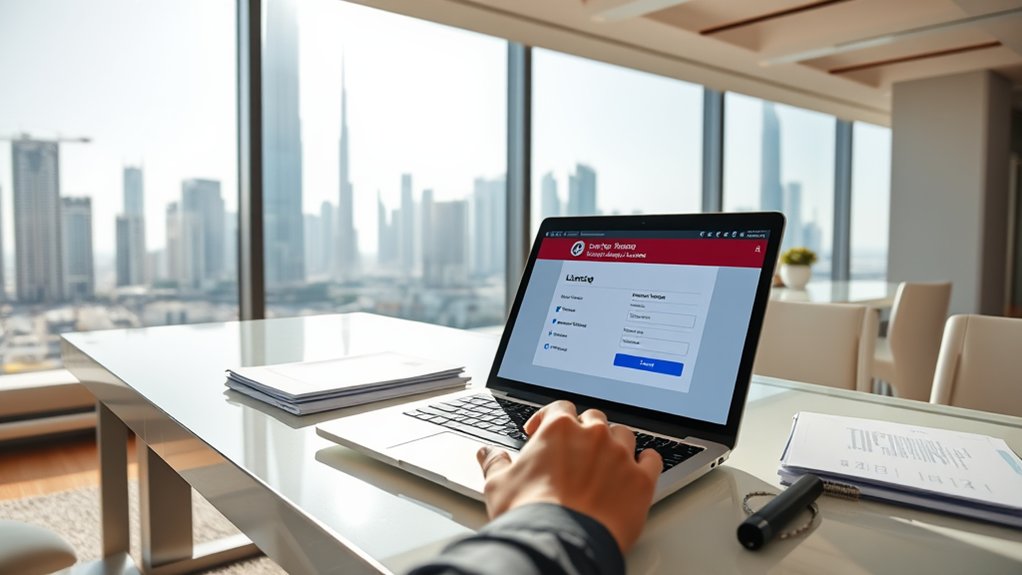To apply for a General Trading License in Dubai, you start by obtaining initial approval from the Department of Economic Development (DED) and selecting a unique trade name. Next, choose your legal structure, such as a Limited Liability Company (LLC) or sole proprietorship, and secure a compliant physical office space. You'll then compile necessary documentation, including passport copies and a completed application form, before submitting it to the DED along with requisite fees. Finally, guarantee adherence to customs regulations for imports. Engaging with a specialist can facilitate this process, revealing further insights into the complexities of business establishment.
Understanding General Trading License

When you're considering starting a business in Dubai, understanding the General Trading License is essential. This license allows you to import, export, and trade a diverse range of goods, excluding prohibited items like tobacco. Both UAE nationals and foreign investors must secure this license to engage in various trading activities. The application process begins with obtaining initial approval from the Department of Economic Development (DED) and registering a suitable business name. Additionally, you'll need to arrange for physical office space, which is critical for your operations and securing the license. Be prepared for an estimated cost ranging from AED 10,000 to AED 15,000, influenced by factors such as your business structure and location within Dubai. A General Trading License is ideal for businesses engaging in multiple trading activities that require flexibility in their operations.
Types of Trading Licenses
Dubai offers several types of trading licenses, each tailored to specific business activities. The General Trading License permits a broad range of trading across multiple product categories, making it highly versatile. If you're involved in buying and selling goods, a Commercial License is essential, while a Professional License suits service-oriented businesses like consultants and lawyers. For manufacturing activities, you'll need an Industrial License, which mandates physical office space ownership. Alternatively, if your business operates primarily online, the E-Commerce License is designed to facilitate digital trade. Additionally, trading licenses in Dubai can be categorized geographically, with Mainland Licenses allowing trade throughout the UAE, whereas Free Zone Licenses offer benefits such as 100% foreign ownership and tax exemptions within designated areas. Trade licenses in Dubai provide legal recognition and protection for businesses, enhancing their credibility in the market.
Benefits of a General Trading License

One of the key benefits of a General Trading License is its ability to streamline your business operations by allowing import, export, and sale of a wide variety of goods under a single license. This flexibility enables you to engage in multiple product categories, unlike a standard trading license, enhancing market reach. Moreover, the UAE's strategic location provides unparalleled access to local and international markets, fostering growth opportunities for your business. The simplified application process and quick approval times make obtaining a General Trading License particularly attractive. Additionally, businesses benefit from a business-friendly environment characterized by low tax rates and exemptions from certain import and export duties, further supporting your trading endeavors in Dubai. The process for obtaining the license is designed to be efficient, allowing for minimal bureaucratic hurdles that facilitate the establishment of new businesses.
Free Zones vs. Mainland Licenses
While deciding between Free Zone and Mainland licenses, it's essential to understand the key differences that can impact your business strategy. Free Zone licenses allow for 100% foreign ownership, ideal for businesses focused on international trade without the need for a local partner. However, they restrict trading within the Free Zone and internationally. In contrast, Mainland licenses require at least 51% ownership by a UAE national, enabling you to trade across the entire UAE market. Free Zones offer exemptions from import and export duties, providing a significant cost advantage. Additionally, Free Zone licenses often entail fewer regulatory compliance obligations, making them more business-friendly. Ultimately, your choice should align with your operational objectives and market ambitions. Furthermore, many Free Zones provide modern infrastructure and logistics support, enhancing business efficiency and connectivity.
Steps to Apply for a License

Applying for a General Trading License can seem overwhelming, but breaking it down into clear steps simplifies the process. First, choose a unique trade name and obtain approval from the Department of Economic Development (DED). Next, select a legal structure for your business, such as an LLC or sole proprietorship, while clearly defining your intended business activities. Securing a physical office space in Dubai is essential, as a valid business address is a requirement for your trade license application. After these steps, submit the necessary documentation, including passport copies, a completed license application form, and payment receipts, to the DED. Finally, guarantee compliance with additional requirements, such as customs clearance for imports, to complete the licensing process efficiently.
Required Documents for Application
When applying for a general trading license in Dubai, you'll need to prepare specific identification documents for all shareholders. This includes their passports, residence visas, and Emirates IDs, which are essential for verifying their identities. Additionally, you'll have to provide documentation related to your office space, ensuring that it meets local regulations and supports your business activities effectively.
Shareholder Identification Requirements
To successfully apply for a general trading license in Dubai, you need to gather several key documents for shareholder identification. This documentation is essential for verifying identities and legal standings. Make sure you collect the following:
- A copy of each shareholder's passport, which confirms identity and nationality.
- A recent passport-sized photo that adheres to the specifications set by the licensing authority.
- A copy of the residence visa for each shareholder, proving their legal residency in the UAE.
Additionally, if you have corporate shareholders, you may need certificates of incorporation or a memorandum of association. Finally, don't forget each shareholder's Emirates ID, as it serves as an official identification document in the UAE, further supporting your application.
Office Space Documentation
Securing the right office space is essential for obtaining your general trading license in Dubai. You must provide specific office space documentation, including a tenancy contract that confirms your physical business address. The selected commercial space must comply with local regulations and meet minimum size requirements tailored to your business activities. Remember, home-based offices are not permitted for general trading.
| Required Document | Description |
|---|---|
| Tenancy Contract | Proof of physical business address |
| Business Name | Must match the name on your Dubai General Trading License |
| Compliance Certificate | Verification of adherence to local regulations |
Failure to secure appropriate office space documentation can notably delay your licensing process. Verify all details align to facilitate a smooth application.
Choosing Your Business Structure

Choosing the right business structure is essential for your general trading license application in Dubai, as it greatly affects ownership rights and operational flexibility. Consider the following options:
- Limited Liability Company (LLC): Ideal for foreign investors, allowing 100% ownership in free zones, though a local partner is needed on the mainland.
- Sole Proprietorship: Suitable for UAE nationals, granting full ownership but limiting liability protection compared to an LLC.
- Free Zone Entity: Offers tax exemptions and no import/export duties, appealing for businesses focused on international trade.
Understanding the implications of each business structure, including capital requirements and regulatory obligations, is vital for compliance and successful operations in Dubai. Make an informed decision to optimize your General Trading License application process.
Importance of Name Approval
When applying for a general trading license in Dubai, obtaining name approval is a vital first step that can't be overlooked. This process guarantees your selected trade name complies with the Dubai Economic Department's guidelines, establishing a solid foundation for your business identity. You'll need to choose a unique name that accurately reflects your activities and isn't already registered by another entity. In addition, it's important to avoid any prohibited words or phrases that could mislead customers or imply government affiliation, as dictated by the DED. Securing name approval not only validates your business identity but also allows you to advance in the licensing process, guaranteeing a smooth shift to subsequent steps in establishing your enterprise.
Securing Office Space

To secure your general trading license in Dubai, you'll need to guarantee you have appropriate office space that meets specific requirements. This space must serve as your registered business address, located within Dubai, and can vary in size and type based on your business's scale and shareholder count. It's essential to choose a commercial area for better visibility and accessibility, and you'll need to present a tenancy contract or lease agreement to the Department of Economic Development as part of your application.
Office Space Requirements
Securing a physical office space is vital for obtaining a General Trading License in Dubai, as this location serves as your business's registered address. Your office space must comply with local regulations and can take various forms, such as:
- A commercial office, tailored for administrative operations.
- A warehouse, suitable for storage and logistics.
- A retail space, ideal for direct consumer engagement.
Minimum size requirements differ based on your business type and jurisdiction, established by the Department of Economic Development. Remember, a lease agreement must be submitted as part of your licensing documentation, as virtual offices are not permitted; a tangible location is critical for customs and operational purposes. Verify your chosen office meets all these criteria for a smooth licensing process.
Location Considerations
Choosing the right location for your office space is essential not only for compliance but also for the success of your trading activities. In Dubai, securing office space is a mandatory requirement for obtaining a general trading license, as it serves as your official business address. You'll need a rental agreement valid for at least one year to meet local regulations. The location can considerably impact your licensing options; for instance, businesses in Free Zones enjoy the advantage of 100% foreign ownership without necessitating a local partner. Be mindful that rental costs vary widely, influencing your overall startup costs, which typically range from AED 10,000 to AED 15,000, inclusive of office expenses.
Customs Clearance Process
Steering the customs clearance process in Dubai is essential for any business looking to import goods into the UAE. To navigate this efficiently, consider these key steps:
- Obtain an import code from the Customs Authority, a prerequisite for all imports.
- Prepare detailed documentation, including a commercial invoice, packing list, bill of lading, and any necessary permits or certificates.
- Ensure compliance with health and safety standards, particularly for restricted items that may require additional approvals from the Dubai Health Authority.
Be aware that customs duties typically range from 5% to 20% of your goods' value. The duration of the customs clearance process can vary considerably, depending on the thoroughness of your documentation and the nature of the imported goods.
License Fees and Costs

When you're considering a general trading license in Dubai, understanding the initial and ongoing costs is vital for effective budgeting. The starting fee is around AED 6,875, but you should account for additional expenses like trade name reservations and processing fees, which can greatly impact your total investment. Furthermore, keep in mind that annual renewal fees typically mirror the original application costs, making it essential to factor these into your long-term financial planning.
Initial License Fees
Securing a general trading license in Dubai involves initial fees that typically start at AED 6,875, but this amount can vary based on your specific business type and location. When estimating the total costs, consider the following components:
- Trade name reservation: AED 620
- Initial approval fees: AED 120
- Tasheel fees: AED 345
Factoring in these additional expenses, the overall cost for obtaining a general trading license can range from AED 10,000 to AED 15,000. However, for some businesses, costs can escalate considerably, potentially reaching up to AED 50,000, especially when accounting for office space rental and visa fees. Keep in mind that renewal fees are comparable to the initial application costs, ensuring ongoing compliance with local regulations.
Additional Expenses Overview
After understanding the initial license fees, it's important to contemplate the additional expenses that come with obtaining a general trading license in Dubai. These costs can remarkably impact your overall budget for business setup. For instance, license fees include trade name reservation at AED 620 and initial approval fees of AED 120. Furthermore, specific approvals, office rent, visa fees, and municipality fees can further escalate your expenses. It's imperative to factor in annual renewal fees, which often mirror initial application costs, ensuring compliance and uninterrupted operations. If you consider establishing your business in Free Zones, you may find basic licensing packages more affordable, typically ranging from AED 11,000 to AED 15,000, depending on your chosen zone and business activities.
Renewal Fee Structure
To keep your business running smoothly in Dubai, understanding the renewal fee structure for a general trading license is essential. The annual renewal fee typically ranges between AED 6,875 and AED 15,000, influenced by your business's type and scale. Additionally, you should anticipate:
- Fees for visa quotas and trade name reservations.
- Regulatory charges, including municipality fees.
- Potential penalties if you fail to renew timely, risking suspension of your business activity.
Budgeting for total renewal costs can exceed AED 50,000 when including all associated fees. As a result, make sure you account for these additional costs to maintain compliance and avoid any disruptions that could affect your operations in Dubai.
Compliance and Renewals
Guaranteeing compliance with local regulations is essential for maintaining your general trading license in Dubai. To avoid penalties and guarantee uninterrupted business activities, you must adhere to financial reporting and VAT obligations. Annual renewal of your license is mandatory, requiring the submission of updated documentation and the timely payment of relevant fees. If you fail to renew your general trading license on time, you risk suspension of your business activities until compliance is restored. Consulting a business setup specialist can streamline the renewal process, helping you prepare the necessary documentation and navigate local laws effectively. Keeping the Department of Economic Development informed through regular updates guarantees you remain compliant with any regulatory changes affecting your trading activities.
Modifying Your License

When you're ready to modify your general trading license in Dubai, you'll need to initiate the license upgrade process by submitting an application to the relevant authority. This involves providing updated documentation that clearly outlines the changes you wish to make, whether they pertain to your business activities, company structure, or name. It's essential to guarantee that these modifications align with local regulations and industry standards to maintain compliance and avoid potential penalties.
License Upgrade Process
If you're looking to modify your General Trading License in Dubai, you'll need to submit an application to the relevant licensing authority along with updated documents that reflect the changes in your business activities. This license modification process often entails additional approvals to guarantee compliance with local regulations. To facilitate a smooth shift, consider the following steps:
- Prepare a stakeholder resolution to outline changes.
- Update your memorandum of association to reflect new activities.
- Gather any necessary permits related to the modified business operations.
Be prepared to pay applicable fees associated with the license modification. It's advisable to consult with a business setup specialist to navigate the complexities and guarantee all regulatory requirements are met effectively.
Document Submission Requirements
To successfully modify your general trading license in Dubai, you'll need to gather and submit specific documentation reflecting your business changes. Begin by completing the application form and including your current license. Depending on the nature of your modifications—such as changes to shareholders or business activities—you may require additional approvals from relevant government departments. It's essential to guarantee that your document submission requirements align with local regulations, as inaccurate documentation can lead to processing delays. Consulting with a licensing specialist can provide clarity on the implications of these modifications and help guarantee that all legal requirements are met effectively. Accurate documentation will streamline your application process and facilitate a smoother shift for your business activities.
Marketing Your Trading Business
Marketing your trading business in Dubai requires a strategic approach to effectively reach your target audience. To enhance your market presence, consider implementing these key marketing strategies:
- Digital Marketing: Utilize SEO and PPC advertising to boost your online visibility and attract potential customers.
- Social Media Engagement: Leverage platforms like Instagram, Facebook, and LinkedIn to showcase your products and foster a brand community.
- Local Advertising Methods: Implement targeted advertising using flyers, banners, and billboards in high-traffic areas to connect with specific market segments.
Additionally, participate in industry trade shows and networking events to establish connections with suppliers and clients. Tailor your marketing strategies to resonate with the diverse preferences of your audience, ensuring effective communication of your trading offerings.
Frequently Asked Questions
How to Get a General Trading License in Dubai?
To get your general trading license, understand the license requirements, follow the application process, prepare a document checklist, and consult regulatory authorities. Also, consider cost implications for your business setup to avoid surprises.
What Is the Cheapest General Trading License in Dubai?
Finding the cheapest options for a general trading license in Dubai isn't easy. You'll need to navigate license requirements, application processes, and renewal fees while considering cost comparisons and government regulations for efficient business setup.
What Are the Three Types of Trade Licenses?
In Dubai, you'll encounter three types of licenses: Commercial, Professional, and Industrial. Each serves different business categories, offering unique benefits, requirements, and legal procedures, including a renewal process to adhere to local regulations.
How Much Is a Trade License in Dubai?
The cost of a trade license in Dubai varies greatly. When budgeting, consider application fees, license renewal, and legal requirements. Conduct market research and financial planning to maximize business benefits and guarantee compliance throughout the process.
Conclusion
In summary, obtaining a general trading license in Dubai is a strategic endeavor that demands careful planning and adherence to regulatory protocols. By understanding the nuances of license types, recognizing the benefits of compliance, and steering through the application process with precision, you position your business for success. Whether you choose a free zone or mainland license, ensuring ongoing compliance and making informed modifications will empower you to thrive in a competitive marketplace and realize your entrepreneurial aspirations.










